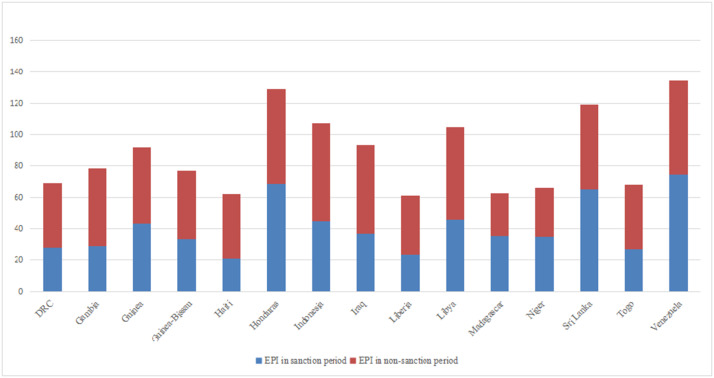When all the different methods of influence failed, the human need gave birth to a new tool to the list of covert and overt forms of foreign policy options.
These can be used as a coercive measure to limit the target Nation’s economy for accomplishment of particular policy goals, for trade, for being perceived as a security threat to one’s Nation or for humanitarian violations.
At times, these sanctions are used as an alternative weapon instead of going to war to achieve desired outcomes.
In a globalized world where War is not the option, the action of one state often affects parts of or even the whole international community.
The states may barely use military force against each other anymore, ostensibly the economic sanctions have become an increasingly prominent and effective tool of statecraft in international politics. They are considered a nonviolent, more humane alternative to military interventions as they aim at changing the target nation’s policies by inflicting economic damage (Neuenkirch & Neumeier, 2016).
The UN Security Council imposes such sanctions under Chapter VII of the United Nations Charter. Sanctions measures(Article 41) involving no use of arms.
Since 1966, the Security Council has established 30 sanctions regimes including against ISIS and Taliban.
Today, there are 14 ongoing sanctions regimes which focus on supporting political settlement of conflicts, nuclear non-proliferation, and counter-terrorism.
These sanctions can be multilateral(when by UN or EU) or can be unilateral(by one country on another) or can be bilateral.
It can be targeted against even an individual or a group.
Through certain established studies, it has been established that though the short term impacts of these sanctions on the Nation State can be satisfactory but they may disappear. But the long term effects of the sanctions are on the population of the targeted nation.
The impacts are:
1. On Economic aspects
- such as increased levels of poverty and significant declines in the GDP per capita, rising unemployment and inflation etc
- Licensing for business and industries is required at times to bypass these.
- In Venezuela, recently imposed sanctions have exacerbated already high inflation rates.
2. On social aspects
- Unavailability of food, essential meds, gloomy healthcare services, disregarded education etc
- It gives birth to war-like grim situations of the public that can barely survive on its own with reduced economic capacity and rapidly waning resources.
3. On Environmental aspects, recently established
- Also indirectly damages the environment.
- Targeted countries, driven into global isolation in the short run, may resort to survivalist and populist tendencies to evade the sanctions’ grip.
The nation state is obliged to prioritise its citizens’ wellbeing and, in a perceived existential crisis, attempts to shield them from the economic sanctions’ detrimental effects by ramping up domestic energy production or implementing unsustainable agricultural practices. Eg: sanctions by US on Iran.
However, the studies have revealed that only unilateral economic sanctions of the US are indeed damaging to the target Iran’s CO2 emissions.
Although there have been several studies to find the Nexus between economic sanctions and environmental degradation but one is noticeably prominent:
Neumayer & Neuenkrich 2016: “Our results indicate that US sanctions, in particular, are adversely affecting the poor as we observe a 3.8 percentage point larger poverty gap in sanctioned countries compared to the control group that is as similar as possible in terms of observable pretreatment characteristics.”
The research also found that increasing wealth allows a state to accumulate the ‘environmental protection capital’ necessary for acting to protect the environment.
Therefore, the environmental performance of a country depends mainly on the government’s interest to use these four means and the amount of capital it invests to tackle environmental problems.
The study aptly points out that Unilateral sanctions are rarely effective and subsequent secondary sanctions can make matters even worse.
Recent case of sanctions by US on Iran after the failure of JCPOA. Although the European Union undertook the “EU Mechanism” to assuage Trump’s “Maximum Pressure“, especially giving birth to INSTEX(a bypass currency for trade with Iran amidst sanctiobs) but it could not significantly alleviate the troubles of US targeted Iran.
Iran has been under such sanctions for more than 40 years. The sanctions target critical sectors of the country’s economy, such as energy, shipping, automotive, aviation and finance, which are all crucial to sustainable development.
Indeed it s experiencing not only intense social and economic distress but also an ever-worsening environmental crisis.
US economic sanctions have impeded Iran’s ability to pursue sustainable development policies and implement efficient environmental protections for years.
These can have spillover effects at global, local as well as regional level.
For instance, Iran-Iraq border area is rich in natural resources- its vast oil and gas reserves plus, it is very agriculturally fertile and valuable.
But Tehran has accelerated water-resource infrastructure developments to boost agricultural output and ensure food security, leading to rapidly receding ground-water levels and excessive pressure on these proud Mesopotamian lands.
As a result this recognised UNESCO World Heritage Site has been partially drained to reclaim land for agriculture or oil exploration.
To secure its energy supply, Iran has turned petrochemical factories into oil refineries.
Reports suggest that Iran’s home-grown petrol contains ten times the level of contaminants found in imported fuel, and the sulphur content of its domestically produced diesel is 800 times higher than that of the international standard.
This consequent quest for ‘More’ triggers a chain reaction.
Therefore, moving forward a more environmentally focused foreign policy model is required to serve the Humanity that is yearning for better livelihoods and environmental consonance.
It is high time that Humanitarian exceptions should be included as part of any comprehensive sanctions.
Sanctions are political tools aimed at cordoning off and impairing a target country’s economy. They should not become tools aimed at polluting and devastating the world’s environment.




